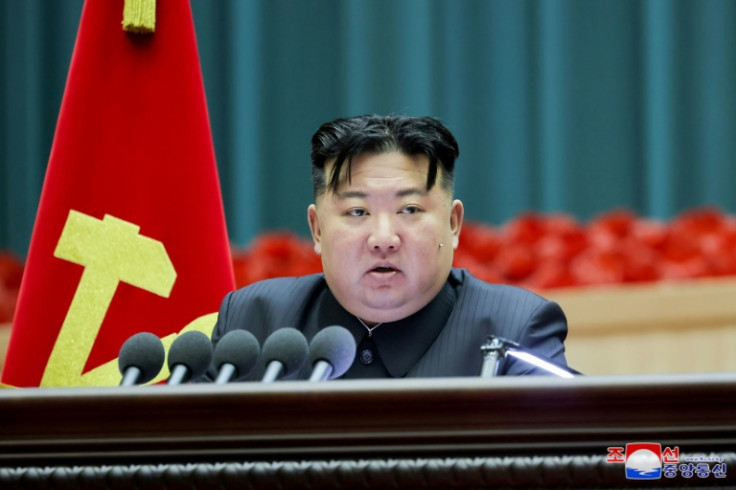
North Korean "smuggling networks" are registering ships in Pacific nations to disguise themselves while trafficking oil, according to former United Nations sanctions experts and documents obtained by AFP.
With strict sanctions limiting Pyongyang's ability to import fuel, North Korean smugglers have adopted increasingly creative methods to deceive authorities and dodge scrutiny.
These efforts, security analysts said, could be directly linked to the North's military ambitions.
"Almost none of the Pacific Islands have escaped North Korean attempts to hide their vessels," said Neil Watts, a former member of the UN Security Council's expert panel on North Korea.
The Washington-based Center for Advanced Defense Studies has been monitoring the bustling shipping lanes of the Taiwan Strait and Korean Peninsula.
An internal sanctions database compiled by the think tank, and seen by AFP, identifies 17 vessels registered in the Pacific nations of Palau, Niue, Cook Islands or Tuvalu.
By tracking these ships, the centre's researchers have identified patterns of "high risk behaviour" that they believe are linked to "illicit" North Korean oil supply chains.
A further 11 vessels flagged to Niue or Palau have been named in separate UN Security Council reports published since 2020, accused of carrying fuel shipments bound for North Korea.
Watts, a former captain in the South African navy, said smugglers were looking to create "layers of obfuscation".
This made it difficult for investigators to determine if a vessel was sailing on legitimate business, or if it was stuffed with contraband cargo.
In August 2020, a 6,000-tonne tanker was acquired by new owners after more than a decade hauling freight for a Vietnam-based logistics company.
Shipping records show it was swiftly christened with a fresh name, the Sky Venus, and registered to sail under a new flag -- the blue and yellow banner of Palau.
Although the Sky Venus easily blended in among the shipping fleets of Asia, UN investigators began to notice a series of suspicious movements.
It would dock at oil terminals to pump its tanks full of petroleum, UN sanctions reports allege, before meeting smaller vessels on the open sea to siphon off its cargo.
By mid-2021, the reports allege, the tanker was being run as a smuggling "mothership".
Through these chains of "ship-to-ship" transfers, investigators allege the fuel was ultimately hauled back to North Korea.
What flag a ship flies has little to do with where it was built, where its crew are based or the nationality of its owners.
Owners can pick which flag they sail under by paying a fee -- sometimes just thousands of dollars -- to join a country's shipping registry.
Sanctions expert Hugh Griffiths, who led the UN Security Council's North Korea panel from 2014 to 2019, said some Pacific registries were deliberately targeted by smugglers.
"Put simply, North Korean smuggling networks know that these registries are not monitoring the vessels which sail under their flag," Griffiths told AFP.
"Smugglers in general have 'flag hopped'. The Cook Islands used to be more popular, then it was Kiribati, then Palau, then Niue."
A UN sanctions report singled out Niue in March this year, saying its registry failed to conduct "convincing due diligence" when registering two suspect ships in 2022.
Those vessels -- the Anni and the An Hai 6 -- declared they were sailing to Japan under Niue's flag.
But they unexpectedly veered off course and docked at North Korea's main port of Nampo instead.
Both ships are now registered in North Korea, according to records from the International Maritime Organization.
Joe Byrne, a research fellow with the Royal United Services Institute in London, said Pyongyang was constantly plotting new ways to conceal "illicit operations".
While shipments of coal or oil might seem relatively harmless, Byrne said these helped fuel the country's military ambitions and weapons programmes.
"Whether it's revenue generation from exports of coal, or keeping its missile launchers on the road with imported oil, North Korea's sanctions evasion is directly linked to its nuclear weapons and ballistic missile program," Byrne told AFP.
In rare cases, investigators can unwind smuggling networks by tracking ships as they sail into North Korea.
But more commonly they are forced to untangle convoluted financial webs expertly designed to hide who is pulling the strings.
"You can close down a shipping company and it's gone. But it doesn't take much to open up a new one, and you'll find the same people involved," said economist Bill Newcomb, the finance specialist on the UN Security Council's North Korea panel between 2011 and 2014.
A spokesperson for Palau shipping confirmed that five vessels -- linked to sanctions evasion between 2017 and 2022 -- had been struck off the country's registry.
Two additional ships had been deregistered before they were accused of smuggling, she said.
"While we acknowledge the global concern over deceptive shipping practices in sanction evasion, our role as a ship registry is to ensure vessels pass clear compliance checks based on available sources and information," the spokesperson added.
Niue shipping officials said the country's registry had been "abused" by smugglers in the past.
"It was unfortunate that the Niue Ship Registry was abused in the case of the An Hai 6 and Anni, where there were no signs of the vessels being linked to North Korea during the registration process."
Cook Islands confirmed three vessels had been stripped of the country's flag between January 2020 and April 2021.
"The Cook Islands abide by UN sanctions and any vessels found to be involved in sanctions evasions are removed from the Cook Islands flag," registry chief executive Moeroa Mamanu-Matheson told AFP.
Tuvalu said North Korean smugglers used "elaborate tactics" and that "sanctions evasion activities plague all flags".







